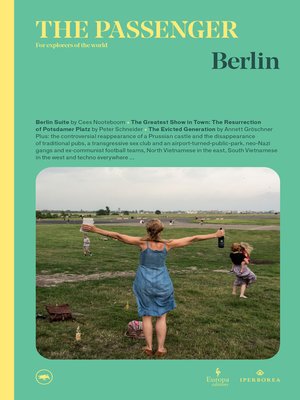
Sign up to save your library
With an OverDrive account, you can save your favorite libraries for at-a-glance information about availability. Find out more about OverDrive accounts.
Find this title in Libby, the library reading app by OverDrive.



Search for a digital library with this title
Title found at these libraries:
| Library Name | Distance |
|---|---|
| Loading... |
The Passenger collects the best new writing, photography, and reportage from around the world. Its aim, to break down barriers and introduce the essence of the place. Packed with essays and investigative journalism; original photography and illustrations; charts, and unusual facts and observations, each volume offers a unique insight into a different culture, and how history has shaped the place into what it is today. Brimming with intricate research and enduring wonder, The Passenger is a love-letter to global travel. IN THIS VOLUME, Peter Schneider, Cees Nooteboom, Vincenzo Latronico among other German writers tell of a youthful city that doesn't cling to its "poor but sexy" past. "Berlin is too big for Berlin" is the curious title of a book by the flaneur Hanns Zischler, who joked about the low population density of a city so spread-out and polycentric—one of the reasons why it still inspires feelings of freedom and space. But the phrase also carries a symbolic, broader meaning: how can a single city encompass and sustain such a weighty mythology as that of contemporary Berlin, "the capital of cool"? In order to find out, it is necessary to go back to the origins of today's Berlin, when time seemed to have stopped. The scars of a century of war were still visible everywhere: coal stoves, crumbling buildings, desolate minimarts, not a working buzzer or elevator. To visit the city then was a hallucinatory experience, a simultaneous journey into the past and into the future. The city's youth seemed to have appropriated—and turned into a positive—the famous phrase pronounced by Karl Scheffler at the beginning of the 20th century: "Berlin is a place doomed to always become, never be."







